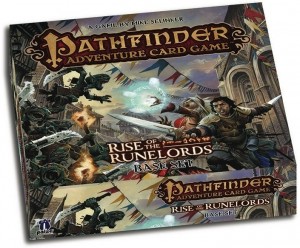 Had the opportunity to play Pathfinder Adventures at Escapist Expo, and it was immediately obvious why this game is going to do well, but it was equally obvious why I probably won’t be picking it up.
Had the opportunity to play Pathfinder Adventures at Escapist Expo, and it was immediately obvious why this game is going to do well, but it was equally obvious why I probably won’t be picking it up.
I won’t delve too deep into the mechanics, but the gist of it is that you have a pathfinder character represented by some core stats and a deck of cards, which includes things like spells, items, allies and so on. You go on adventures which involved exploring locations, each of which has a deck full of monsters, challenges and opportunities for loot.
This is all pretty straightforward, but what makes it such a potent idea is that it’s built around an idea of character persistence. That is, once you build your character deck, you keep it, and you end up marking up your character card as you gain experience.
This is a super powerful gimmick. The idea of a character represented by a deck of cards has been a grail of RPG design for years, and this is a strong swing at it. Yes, the game is more about the trappings of an RPG than an actual RPG, but that’s not intrinsically bad. But that idea of personal ownership (and the implicit portability) is really, really compelling as a player.
I pretty much expect it to rock out based on that. Owning your character deck and bringing it to the night’s adventure is fun and compelling.[1]
But it’s also what throws me a bit, because it suggests a very curious ownership model. See, the core box (which weighs in at a non-trivial $60) contains the cards required for the core set of a characters and enough cards for a campaign (expansions contain new campaigns). When cards go to a character, they are taken out of the box (effectively) and put into the character’s personal deck.
Now, I can totally se this working in the arrangement I had in my 20s, where one box would get bought for the group, people could take out their own decks, and we’d play with the same people out of that set. Nowadays, my playing is more erratic, and I’m uncertain that the prospect of maintaining a deck for players who only show up rarely (and removing those cards from circulation) holds much appeal. This gets weirder still in convention scenarios or cases of multiple boxes (something which makes playing from the game library a strange experience) where cards changing hands might be odd.
All of which is to say that the game intrigues me, but the $60 buy in is high for something that seems slightly awkward with my schedule and style. But I completely see the appeal for other folks.
That said, I also considered buying a box for entirely unrelated reasons – the character sheets look a lot like Cortex Plus characters, and some part of me wondered if I could use them in a more freeform way (using the monster and obstacle cards dynamically) to run something like fantasy Leverage.
Sadly, it was not to be. The cards as written really depend upon the specifics of deck manipulation for their moxie. and pulling them out of that context removes most of the advantages of doing something other than just faking it. But it has planted in my mind the idea of building those decks myself, just for my own fun, so that’s something.
- They also seem to be doing interesting things with the expansions. Some of the stuff is predictable (extra character decks, for example) but they’re also offering a subscription to the adventure decks. I’m fascinated by this model. ↩
Paizo has printable character sheets you can use to track decks. Not as elegant as just keeping the decks, but more practical for situations like yours.
Hinteresting! Thank you!
I’ve had the same problem with the newest Warhammer RPG, in which all the attacks and special abilities are represented by cards. You can write them down, but they’re designed to be flipped to indicate that they’re on cooldown or to change stances. Whenever a new player shows up, you have to decide whether a previous player is ever going to play again so you can put his cards back in the options for the new player. Also makes it hard to add any house-ruled effects, and takes forever to set up for a session (getting all the GM cards and tokens placed for easy access).
From the side of an RPG (vs. the Pathfinder game which is more of a deck building game), it seems to be a pretty effective way to monetize for more than the core book and resist piracy. FFG, though, seems to have pulled back on the cards for Warhammer (they eventually released a no-card core book). Edge of Empire, AFAIK, is just special dice without any other premium cards and tokens. So I wonder if the increased monetization per player is countered by scaring off people due to the high cost of entry.